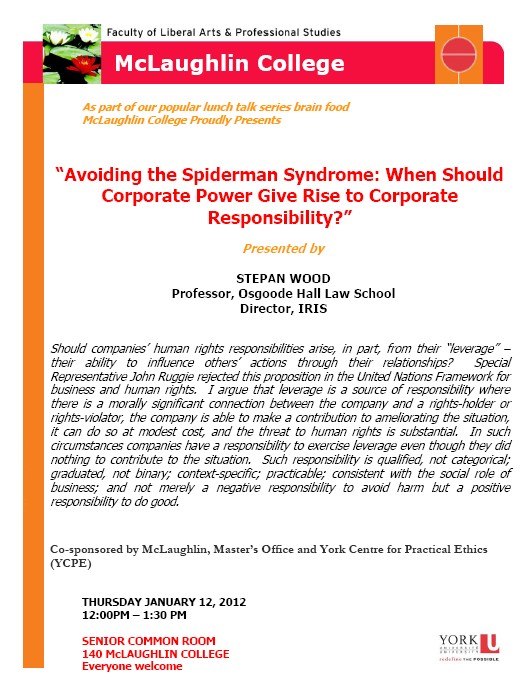This is a re-post. Kevin will be adding some photos and a short comment. This past term at York, Kevin organized a seminar series about Sustainable Value Creation. If you want to learn more about how to be a responsible, activist consumer, please check out the work of the speakers that Kevin brought to York.
"Congratulations to long-time IRIS Senior Research Fellow, now Dr. Kevin McKague, on a successful defence of his dissertation last week.
Kevin's research has focused on micro finance and farmers in Bangladesh. Some of Kevin's research will be published in the journal, California Management Review (McKague and Oliver, 2012 vol 55 no 1. pp. 98-129. Enhanced Market Practices: Poverty Alleviation for Poor Producers in Developing Countries)
Over the years, Kevin has been active in the IRIS community and has brought in excellent seminar speakers including a wonderful talk on microfinance by speakers from MEDA, the Mennonite Economic Development Association.
Here is his dissertation title and abstract.
Kevin's PhD. is titled, Making Markets Work for the Poor: Market-Based Approaches to Poverty Alleviation as Institutional Leveraging and Redistribution of Social Control
Interest in market-based approaches to reduce poverty has grown substantially in the last decade. To date, however, explanations in the management literature of how this can be achieved have focused on viewing the poor as consumers at the base of the economic pyramid, as microentrepreneurs in need of microfinance loans, and as potential employees of local small and medium-sized enterprises. Missing from the core of the management conversation has been an adequate understanding of the poor as primary producers and an explanation that situates them within their broader market and institutional context. Drawing on an in-depth study of market-based poverty alleviation initiatives for smallholder farmers by a non-governmental organization in a least developed economy, this dissertation offers the first theoretical model to explain the process by which a non-state organization can strategically enhance market practices in ways that reduce poverty for poor producers and improve overall market functioning. Findings suggest that meaningful improvements in income can be explained by the enhancement of market practices that redistribute social control toward poor producers in ways that reduce market and government failures. In addition, data revealed that the effectiveness of market development and poverty alleviation strategies is moderated by the extent of institutional leveraging to incentivize market changes in alignment with existing norms and logics. The model offers an integrated explanation of how market-based approaches can alleviate poverty and grow inclusive markets for poor producers. Findings suggest a number of business implications, including the importance of rebalancing power relations and enhancing productivity throughout an entire value chain. In addition, findings contribute to the literatures on business and poverty alleviation and the literatures on institutional change."
Dawn Bazely


